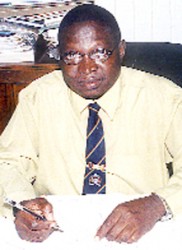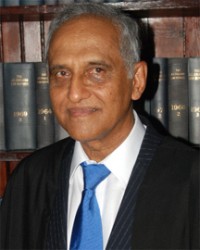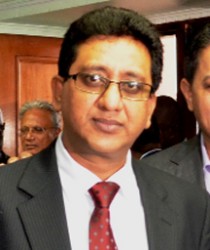Clerk of the National Assembly Sherlock Isaacs yesterday said that during his tenure he has never submitted any bill for presidential assent without an “assent certificate” from the Attorney General.
In a letter yesterday in response to concerns by APNU MP Carl Greenidge about two bills in his name passed by the National Assembly but not receiving the assent of the President, Isaacs explained that in the absence of a Legal Counsel in the Parliament Office, all bills are sent to the Attorney General’s Chambers to ensure that they are properly drafted before they are submitted to the President for assent.
“I have never submitted any bill to the President without an assent certificate from the Attorney General,” Isaacs, who has served as Clerk for more than 10 years, wrote in the letter.
The explanation came even as Attorney General Anil Nandlall said that it has been parliamentary convention for his office to certify bills passed by the National Assembly for presidential assent, while he rubbished suggestions by attorney Christopher Ram that he has no role in the process.
With the two opposition bills recently passed by the National Assembly due to be considered for assent by President Donald Ramotar, Nandlall recently told Stabroek News that they had yet to be sent to the Attorney-General’s Chambers for preparation.
Ram, in a letter published in yesterday’s Stabroek News, argued that there is no need for legislation to go to the Attorney General and that this practice is contrary to what the Constitution says.

Ram contended that Order 65 (2) of the Standing Orders provides that where a bill is passed by the National Assembly, the Speaker has the power to “correct any patent errors and make such other changes in the bill as are consequential upon the amendments accepted by the [National] Assembly.”
He added that Standing Order 67 provides that the bill remains in the “custody of the Clerk of the National Assembly who shall, subject to Article 164 of the Constitution at the earliest opportunity, submit the bill to the President for his or her assent and the President shall assent in accordance with Article 170 of the Constitution.”
He said too that Article 170 (2) of the Constitution of Guyana requires the President, who is part of Parliament, to assent to bills presented to him following passage in the National Assembly. He noted that this article goes on to state that where the President withholds his assent, he must return the bill to the Speaker within 21 days with a message stating the reasons for withholding his assent.
“It is frightening how little the learned Attorney General seems to know of the Constitution or the Standing Orders, even on matters on which he ventures to speak publicly. How he came to the position that he has the power to ‘give his inputs’ to Bills already passed is a mystery which he ought to explain, or retract,” said Ram in his letter.
He said that while it is within the President’s power to consult with his Attorney General on any matter should he choose to do so, it is not within the President’s right or power for him to act outside of the provisions of the Constitution, including the timeframe set out in Article 170 (2).
“No ruse or defect in the understanding by the Attorney General of these requirements should be allowed by the Speaker and the National Assembly to frustrate a Bill properly passed,” said Ram.
Convention

In response, Nandlall explained that it is a convention for the Attorney General to issue an assent certificate to bills passed by the National Assembly before forwarding to the President.
“The letter next contends that the Office of the Attorney General has no input whatsoever in that interregnum between when a Bill is passed by the National Assembly and its assent by the President. It seems to have escaped the author that the Attorney General’s Chambers houses the Office of the Chief Parliamentary Counsel. Additionally, the Attorney General remains, constitutionally, the principal legal adviser of the state apparatus,” said Nandlall.
He added that this is a practice “of great utility” noting that it dates back to the days of the colonial Assembly. All bills passed by the House are to be sent to the Chambers of the Attorney General by the Clerk of the National Assembly, firstly to be examined by the Chief Parliamentary Counsel and then by the Attorney General, who issues an assent certificate advising the President, that he may properly assent to the bill, “provided, of course, that in the opinion of the Attorney General, the bill is in order,” he explained.
According to Nandlall, the assent certificate, together with the bill, is returned to the Clerk of the National Assembly for transmission to the President. “The efficacy of this salutary practice is patently underscored by the fact that the Clerk of the National Assembly, since colonial times, has never been a person formally trained in law and there has never been a legal officer intrinsically attached to the Parliament,” he explained.
“[Ram’s] letter refers to certain Standing Orders and constitutional provisions in support of the contentions advanced. The fact that an extant practice or procedure is not expressly captured by a statute, the Constitution, or, the Standing Orders, does not, ipso facto, render the same either wrong or unconstitutional, is a concept with which the author is, not surprisingly, unfamiliar,” said Nandlall.
He noted that it has long been accepted both in law and in parliamentary procedure that ancient usage, customs and practice will supplement legal vacuums wherever they manifest themselves. “But alas, familiarity with these concepts demands a little more than a superficial acquaintance with the law,” he added.
No further role

The two opposition bills due for consideration for assent are the Fiscal Management and Accountability (Amendment) Bill and the Former Presidents (Benefits and Other Facilities) Bill 2012, which were both piloted by Greenidge.
Isaacs, in his letter yesterday, said that with regard to the Fiscal Management and Accountability (Amendment) Bill 2012, which was passed on January 10, 2013, it was submitted to the Chief Parliamentary Counsel on January 14, 2013 for vetting, returned on January 28, 2013, and submitted with corrections made to National Printers on January 29, 2013 for assent copies to be printed. He said assent copies were collected from National Printers on February 1, 2013 and were submitted to the Attorney General and Minister of Legal Affairs yesterday for his assent certificate to be issued.
Addressing the Former Presidents Benefits and Other Facilities Bill 2012, Isaacs said that the bill was passed on Friday January 25, 2013, sent to National Printers on January 28, 2013 for amendments to be inserted. He added that the bill was then collected from National Printers on January 30, 2013, and submitted to the Chief Parliamentary Counsel on January 31, 2013 for vetting, before being returned yesterday with the errors pointed out. It was sent to National Printers to be corrected, he said.
Meanwhile, former Speaker of the National Assembly Ralph Ramkarran told Stabroek News that from the time a bill is passed in the House, the Speaker has no further role to play and it is the responsibility of the administrative mechanism under the supervision of the Clerk of the National Assembly. He said it is the job of the Clerk to ensure that the bill as drafted correctly represents the decision of the National Assembly. “It is up to the Clerk to consult whom he chooses,” Ramkarran further said.




